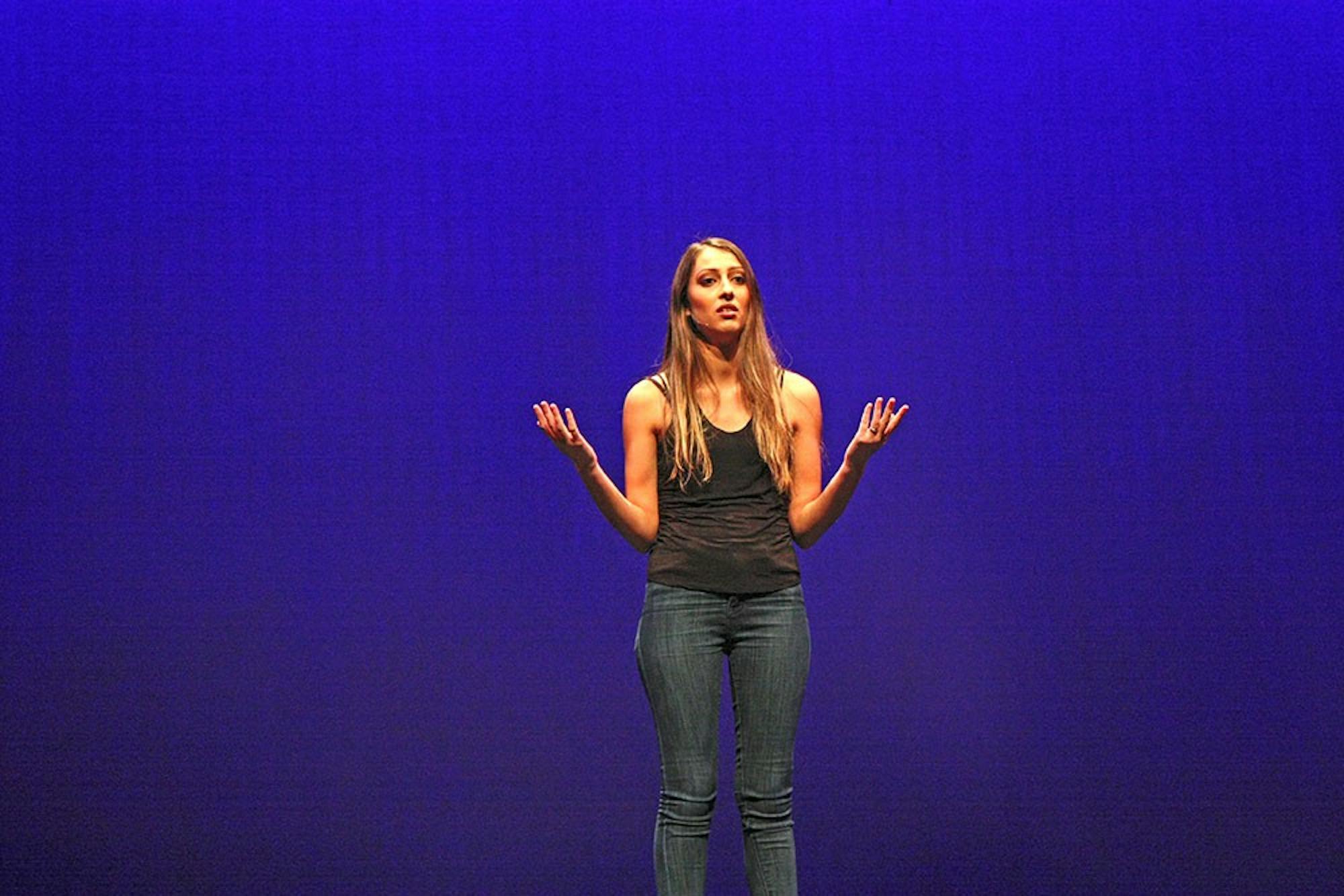“Voices,” showing tonight in the Moore Theater for its third consecutive year, presents a variety of perspectives in a series of monologues, along with a few conversations, all written and performed by self-identifying Dartmouth women. The program is part of V-February, a yearly campaign at the College intended to promote gender equality and end gender-based violence.
This year Kit Gardner ’17, Cori Lopez ’17, Julia Dressel ’17 and Libby Goldman ’18 directed the show, helped organize and run dress rehearsals through six weeks of practice and guided the cast members in writing their pieces.
Started as a response to the “Vagina Monologues,” “Voices” began in 2014, intended to represent the experience of modern-day Dartmouth women. The stories change each year. Some are submitted anonymously and performed by cast members, while others are written by the cast members themselves, Goldman said.
Many, including Goldman and Abby Rohman ’16, found that the “Vagina Monologues,” with a set script written 19 years ago by one woman, Eve Ensler, was a little dated, and did not encompass a lot of experiences, particularly those of self-identifying college-age women.
“Since it was written so long ago, it’s become a little less relevant and not necessarily representative of all women’s voices,” Goldman said. “So ‘Voices’ was started as sort of a response to that, to give Dartmouth women an opportunity to talk essentially about whatever they want.”
Due to common themes, some cast members are also involved with the “Vagina Monologues,” performed at Dartmouth during V-February. Natalie Cantave ’16 and Goldman both found out about “Voices” through the “Vagina Monologues” auditions, as the auditions for both shows are held jointly. Approximately five to six members participated in both performances this year, Cantave said.
The cast of self-identifying Dartmouth women come from all class years and backgrounds, and many, including Rohman and Goldman, have been involved with “Voices” for multiple years.
The issues discussed in “Voices” are not necessarily confined to these topics. The cast members are allowed to discuss nearly anything in the production, Goldman said.
“We’re just giving a space and a voice to these Dartmouth women who can talk about whatever, whether it has to do with being a woman at Dartmouth or sexuality or anything like that or some other facet of life,” Goldman said. “‘Voices’ is really just a platform for women to talk about whatever they want to talk about.”
The show embraces intersectionality, a theory which addresses the existence of coinciding identities and links between different methods of oppression, such as the connection between sexism and racism in the experiences of women of color.
Appropriately, the performance’s first story addresses the definition of feminism, pointedly noting that everyone’s experience is different. The topics vary from piece to piece.“Voices” covers “feminist” veganism, racism at Dartmouth, the coming out process and Native identities and other issues.
Cantave’s story discusses her racial identity at Dartmouth and outside of Dartmouth as an African-American, Cantave said.
“I just hope people understand that there’s different perspectives through the different experiences people have at Dartmouth,” Cantave said. “I’m also kind of nervous to hear people’s reactions to experiences I’ve had, but I think it hits you more in the face if it’s just people you know or kind of have seen around.”
The show also deals with aspects of feminism particularly relevant to Dartmouth’s hookup culture and the larger societal objectification of women. Rohman, for example, discusses the “Dartmouth X” and her subsequent role as a “washed-up girl” as a senior woman.
Although the cast concedes that they cannot cover the experiences of all Dartmouth women, many of them believe “Voices” to be more representative of the college experience.
Goldman finds the show valuable as it addresses taboo issues. She, along with her friend Emily Smid ’18, wrote a light-hearted conversation between Goldman and her vagina, Goldman said.
Rohman commented that many value the show for its sense of community.
“It was awesome to find a group of women who feel the same way about a lot of the things I do,” Rohman said. “It’s also just nice to find a group of women outside of Greek life, outside of my team, who just want to have interesting conversations.”
“Voices” had a sneak peek at BarHop last Thursday as part of a sex trivia event hosted by Planned Parenthood Generation Action. The cast also held a full dress rehearsal on Sunday in Sarner Underground for those who could not make it to the main performance.
“Voices” will be performed at the Moore Theater tonight at 7 p.m. and is free for students and community members.
Natalie Cantave ’16 is a former member of The Dartmouth senior staff.




